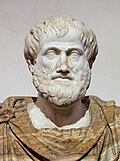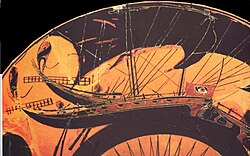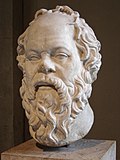Problems (Greek: Προβλήματα; Latin: Problemata) is an Aristotelian or possibly pseudo-Aristotelian collection of problems written in a question and answer...
2 KB (186 words) - 19:01, 24 October 2024
Aristotle (Attic Greek: Ἀριστοτέλης, romanized: Aristotélēs; 384–322 BC) was an Ancient Greek philosopher and polymath. His writings cover a broad range...
155 KB (16,517 words) - 06:10, 17 May 2025
Aristotle's Poetics (Ancient Greek: Περὶ ποιητικῆς Peri poietikês; Latin: De Poetica; c. 335 BCE) is the earliest surviving work of Greek dramatic theory...
38 KB (4,405 words) - 23:14, 14 May 2025
refer to: Problem (rapper), (born 1985) American rapper Problems (Aristotle), an Aristotelian (or pseudo-Aristotelian) collection of problems in question...
2 KB (305 words) - 18:23, 3 May 2025
The problem of universals relates to various inquiries closely related to metaphysics, logic, and epistemology, as far back as Plato and Aristotle, in...
40 KB (4,943 words) - 22:36, 14 April 2025
Aristotle's wheel paradox is a paradox or problem appearing in the pseudo-Aristotelian Greek work Mechanica. It states as follows: A wheel is depicted...
14 KB (1,746 words) - 20:05, 27 July 2024
after the physics"; Latin: Metaphysica) is one of the principal works of Aristotle, in which he develops the doctrine that he calls First Philosophy. The...
25 KB (2,996 words) - 16:16, 15 May 2025
of political philosophy by Aristotle, a 4th-century BC Greek philosopher. At the end of the Nicomachean Ethics, Aristotle declared that the inquiry into...
51 KB (7,052 words) - 14:06, 1 March 2025
other positions, such as physicalism and enactivism, in the mind–body problem. Aristotle shared Plato's view of multiple souls and further elaborated a hierarchical...
98 KB (12,273 words) - 14:37, 30 March 2025
Mechanical Problems or Questions of Mechanics, is a text traditionally attributed to Aristotle, but generally regarded as spurious (cf. Pseudo-Aristotle). Thomas...
2 KB (201 words) - 09:33, 21 October 2024
Aristotle's theory of universals is Aristotle's classical solution to the problem of universals, sometimes known as the hylomorphic theory of immanent...
5 KB (660 words) - 09:12, 2 February 2025
philosophy called atomism. All of these notions had deep philosophical problems. Aristotle (384 BCE–322 BCE) was the first to put the conception on a sound...
80 KB (9,536 words) - 12:51, 7 April 2025
Aristotle's Rhetoric (Ancient Greek: Ῥητορική, romanized: Rhētorikḗ; Latin: Ars Rhetorica) is an ancient Greek treatise on the art of persuasion, dating...
33 KB (4,037 words) - 14:58, 10 February 2025
necessarily true nor necessarily false. The problem of future contingents seems to have been first discussed by Aristotle in chapter 9 of his On Interpretation...
17 KB (2,354 words) - 18:36, 24 January 2024
Potentiality and actuality (redirect from Potentiality and actuality (Aristotle))
potentiality and actuality are a pair of closely connected principles which Aristotle used to analyze motion, causality, ethics, and physiology in his Physics...
54 KB (6,483 words) - 16:54, 7 May 2025
the Corpus Aristotelicum, attributed to the 4th-century BC philosopher Aristotle. It is a collection of treatises or lessons that deals with the most general...
55 KB (5,929 words) - 14:10, 14 April 2025
The works of Aristotle, sometimes referred to by modern scholars with the Latin phrase Corpus Aristotelicum, is the collection of Aristotle's works that...
13 KB (1,441 words) - 16:14, 25 April 2025
from Aristotle, who says in Metaphysics A.IX.990b.15: "(The argument) they call the third man." A summary of the argument and the quote from Aristotle can...
39 KB (5,327 words) - 23:21, 5 May 2025
Four causes (redirect from Aristotle's Four Causes)
material cause, the formal cause, the efficient cause, and the final cause. Aristotle wrote that "we do not have knowledge of a thing until we have grasped...
38 KB (4,885 words) - 22:07, 24 January 2025
Eudaimonia (section Aristotle)
which is commonly translated as happiness or welfare. In the works of Aristotle, eudaimonia was the term for the highest human good in older Greek tradition...
44 KB (6,118 words) - 15:49, 4 May 2025
of Elea (c. 490–430 BC), primarily known through the works of Plato, Aristotle, and later commentators like Simplicius of Cilicia. Zeno devised these...
43 KB (4,624 words) - 19:06, 12 May 2025
Eternity of the world (category Philosophy of Aristotle)
philosophers and scientists. The problem became a focus of a dispute in the 13th century, when some of the works of Aristotle, who believed in the eternity...
15 KB (2,124 words) - 21:21, 13 October 2024
Aristotle's Masterpiece, also known as The Works of Aristotle, the Famous Philosopher, is a sex manual and a midwifery book that was popular in England...
19 KB (2,326 words) - 01:27, 22 April 2025
The Aristotle University of Thessaloniki (abbr. AUTh; Greek: Αριστοτέλειο Πανεπιστήμιο Θεσσαλονίκης (ΑΠΘ), lit. 'Aristotelian University of Thessaloniki')...
90 KB (8,374 words) - 09:19, 16 April 2025
Aristotelian physics (category Philosophy of Aristotle)
described in the works of the Greek philosopher Aristotle (384–322 BC). In his work Physics, Aristotle intended to establish general principles of change...
49 KB (6,445 words) - 21:26, 16 February 2025
Topics (Ancient Greek: Τοπικά; Latin: Topica) is the name given to one of Aristotle's six works on logic collectively known as the Organon. In Andronicus of...
25 KB (3,999 words) - 05:01, 15 February 2025
circular reasoning or infinite regress, and thus exhibiting the regress problem, Aristotle made foundationalism his own clear choice, positing basic beliefs...
19 KB (2,309 words) - 09:59, 12 May 2025
Plato (redirect from Aristotle's teacher)
from Plato himself. Along with his teacher Socrates, and his student Aristotle, Plato is a central figure in the history of Western philosophy. Plato's...
51 KB (5,882 words) - 21:01, 15 May 2025
















